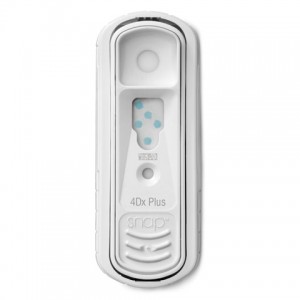Lyme Disease: Prevention
July 15, 2015
A Snap 4DX test is used by mixing a few drops of blood with a blue solution and then dropped on this small test. Results appear in 8 minutes while you wait.
Prevention
In our discussions about Lyme disease, there have been multiple potentially controversial or confusing areas. So we thought it would be a good idea to summarize the current recommendations that we follow.
- No tolerance for ticks – the most important thing you can do for your dog is to avoid tick exposure altogether. No single product is perfect, though many are quite excellent. So, application of a topical or administration of an oral product on the recommendation of your veterinarian is the first step, but not the only step. Check your dog every single day for ticks. Pull them off immediately. Treat them religiously with their products – and although this may cost more doing year-round prevention may be warranted as winters get less predictable.
- Vaccinate – We do recommend Lyme vaccination for most dogs, whether they have heavy or light exposure to ticks. Currently, we now believe that even Lyme positive dogs should be vaccinated. Previous exposure does NOT provide any protection against future infection.
- Test Annually – Our annual heartworm test is actually much cooler – it’s a Heartworm AND Tick-borne disease test! Each year you can learn whether your efforts to prevent ticks and exposure to Lyme have been successful.
After a Positive Result
If a dog comes up positive, but has no symptoms, you should talk with your vet. This situation is controversial, and many vets treat it differently due to a lack of consensus regarding what’s appropriate, and a lack of any good data to tell us the best treatment:
- Most vets will recommend testing the urine. This should be done every 3-12 months while a dog is testing positive for Lyme.
- Some vets will recommend additional tests, such as a complete blood count and a chemistry, and may even recommend doing an additional Lyme test to look for the exact levels of Lyme antibodies.
- Some vets will recommend a course of antibiotics based upon the Lyme antibody levels, some vets will recommend treating regardless, and some vets do not recommend treatment. It has not been proven that treatment does anything, so making this recommendation is usually based upon the vets’ opinion regarding the disease and their experience in treating it.